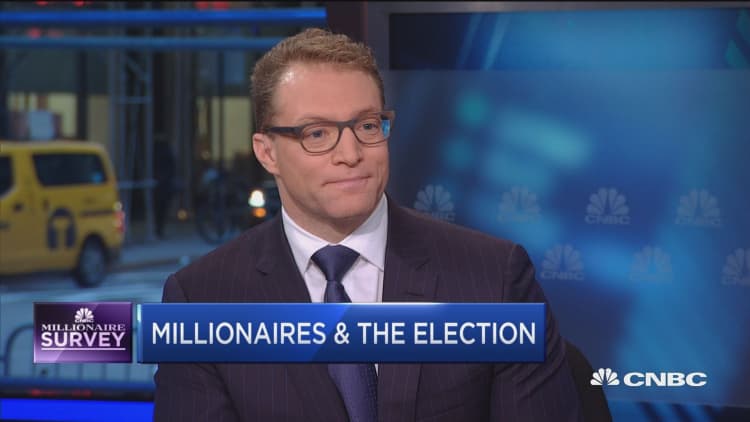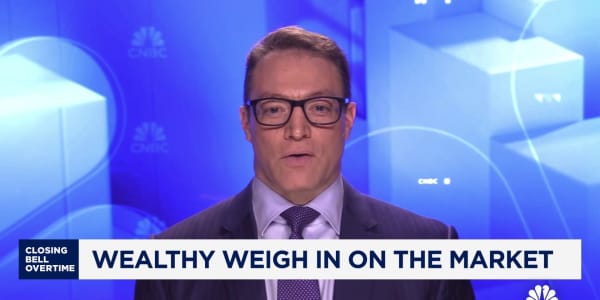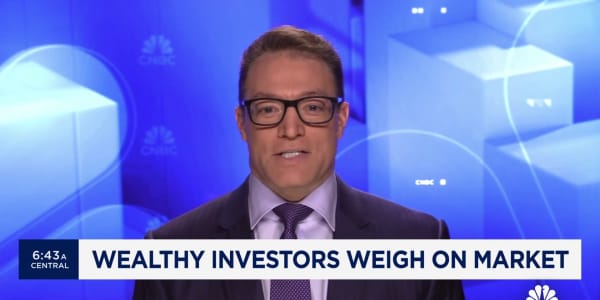
Karen Altfest's wealth management business is based in New York City, and as a result, it has more Democratic than Republican clients. Some are still surprised by the election results; some are pessimistic. Many are planning on what they consider positive action — but experts like Altfest worry that the concept of productive action isn't translating to their investments.
"They are saying they will be activists and want to make a difference. Going to march on D.C.," said Altfest, principal advisor and executive vice president of client relations at Altfest Personal Wealth Management.
But they are also taking an "all-or-nothing mind-set" with their portfolio decisions. "I would like people to take a step back from the binary 'invest or cash out' decision," Altfest said.
The results from the recent CNBC Millionaire Survey reflect this concern: Politics is playing a huge — and potentially harmful role — in the investment outlook of wealthy Americans right now. There's a lesson in the millionaire data for all investors about the dangers of personal convictions, and emotions, spilling over into financial decisions.
"The results certainly show the divide now between parties, and that is a little troubling," said Tom Wynn, director of research at Spectrem Group, which conducted the CNBC Millionaire Survey.
Portfolio politics — The US economy
- Republicans are twice as likely as Democrats to believe the S&P 500 will go up in 2017 (77 percent vs. 38 percent).
- 72 percent of Republicans predict a stronger economy. Only 15 percent of Democrats feel the same way.
(Source: CNBC Millionaire Survey)
Hedge fund billionaire Ray Dalio recently told CNBC that the Trump win may reignite "animal spirits" and "gut instinct" decision-making that will be a good thing for the economy, but behavioral finance experts worry that other primal instincts can be destructive when people play politics with their investments.
"Our overall mood influences our willingness to take risks," said Victor Ricciardi, finance professor at Goucher College and co-editor of the book "Investor Behavior: The Psychology of Financial Planning and Investing."
Republican investors that are in a positive or happy mood are more likely to have an appetite for riskier assets.
Democratic investors that are in a negative mood or pessimistic state of mind might experience a lower level of risk tolerance and are more likely to favor safer investments, such as cash or bonds.
The results certainly show the divide now between parties, and that is a little troubling.Tom Wynndirector of research at Spectrem Group
For investors who are loading up on U.S. stocks and plan to continue to do so, Altfest cautioned that U.S. stocks seem fully priced and there is not a lot of room, or reason, to invest in them. "They may become overpriced. People are more aggressive than they need to be, and we always see that in up markets," she said.
Altfest said that in her professional opinion, it is time to look away from the U.S. market and to overlooked areas around the globe. "It is too late to jump on this bandwagon," she said.
Portfolio politics — Investing
- Almost three times as many Republicans plan to invest more in equities (28 percent) than Democrats (10 percent).
- 22 percent of Democrats are decreasing their equity allocation.
- Democrats are twice as likely to increase short-term investments (25 percent) compared to Republicans (12 percent).
- 79 percent of Republicans anticipate a personal rate of return to be 4 percent or higher in 2017 compared to 52 percent of Democrats.
- 55 percent of Republicans anticipate their household assets being invested higher in 2017 compared to only 31 percent of Democrats.
- Republicans are twice as likely to decrease precious metals holdings (13 percent) compared to Democrats (6 percent).
(Source: CNBC Millionaire Survey)
Even as investors shift to formerly out-of-favor sectors like financials and industrials, Altfest worries that they are still too concentrated in domestic large-cap stocks. "They think they are diversified in individual names, but I don't think that will last long. It's very unlikely to happen that way — have everything in one sector and have that deliver."
But Altfest also thinks investors holding a large part of assets in cash — or planning to go to cash — because they think there will be a catastrophe are making a mistake.
"That is scary, too," Altfest said. "I've heard everything except 'I buried the money in the backyard. ... You should want to participate in the market. Your wealth won't grow in a bureau drawer."
John Payne, a professor at Duke University's Fuqua School of Business, said the financial decisions being revealed in the CNBC Millionaire Survey reflect a basic behavioral finance lesson he has been drumming into the heads of business students for years.
"I think confirmatory thinking (confirmatory bias) is the most common, and impactful, bias that we have uncovered," said Payne. "It leads to other biases, such as overconfidence, as well as influencing group behavior."
People who see the election of Trump as a good thing will, because of confirmatory thinking, be more and more likely to see things as getting better. The opposite will be likely for Democratic voters.
"We are prone to seek new information and interpret old information in ways that confirm what we already believe," Payne said.
Portfolio politics — Beltway debate points
- Democrats view government dysfunction in 2017 as a much bigger threat (45 percent) to their personal wealth than Republicans (21 percent).
- 56 percent of Democrats believe the deficit will increase a great deal under Donald Trump compared to only 7 percent of Republicans.
- Only 27 percent of Republicans believe inequality of wealth in our nation is a problem compared to 88 percent of Democrats and 56 percent of Independents.
(Source: CNBC Millionaire Survey)
The best investing outcomes may result if both Republicans and Democrats move away from their respective euphoria or fear.
"People are venting in this survey, whether it is exuberance or great disappointment," Wynn said.
The CNBC Millionaire Survey was conducted right after the election, between Nov. 11 and Nov. 17.
"When you consider this survey went out a few days after the election and an election that to all pundits was a surprise and provided results people didn't expect, I wonder over time whether the exuberance may dissipate," Wynn said. He added, "People may say it won't be as bad as we thought or on the other side, not as great as we thought it would be."
Payne said he predicts this gap of beliefs and intentions will narrow over time but not completely disappear.
Seeking middle ground
A good place to look for moderation within the extremes? Survey responses from millionaires who identify as political independents.
For the most part, their survey answers fall in the middle of Democrats and Republicans. Independents voted a split ticket much more than major party millionaires, and when it comes to investing and the economy, independents also split their allegiances.
Overall, independents were the least likely to say that the election results would influence their future investing decision (42 percent) compared to Democrats (49 percent) and Republicans (47 percent).
Declarations of the independents
- Independents appear to agree with Democrats that the biggest risk to the economy next year is government dysfunction (38 percent of Independents and 43 percent of Democrats).
- 45 percent of independents think the S&P 500 will be up 5 percent to 10 percent in 2017, alongside 52 percent of Republicans (and compared to 28 percent of Democrats).
- 42 percent of independents and 42 percent of Republicans anticipate a personal rate of return on investments of 4.0 percent to 5.9 percent in 2017.
- More independents have invested in health care (62 percent) than Democrats (55 percent) or Republicans (53 percent).
- Independents invested more in materials (41 percent vs. Democrats at 29 percent and Republicans at 34 percent).
- More independents (15 percent) than Democrats (10 percent) or Republicans (11 percent) say health care is likely to receive the greatest amount of their investments in 2017
(Source: CNBC Millionaire Survey)
(Note on survey: The CNBC Millionaire Survey was conducted in mid-November with 750 investors and has a margin of error of +/- 3.5 percent. It is an exclusive semi-annual summary of the investment attitudes and behaviors of investors with $1 million or more of investable assets.)





